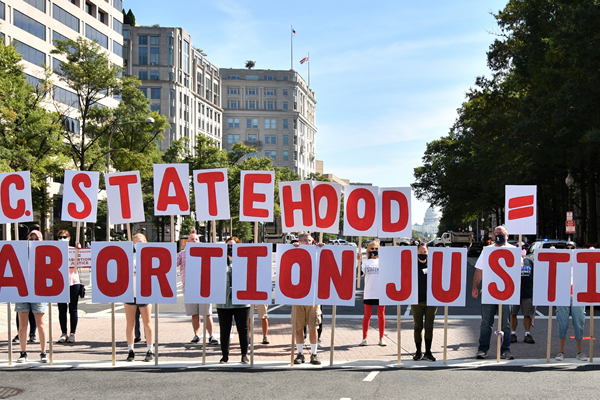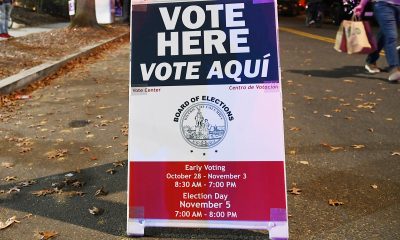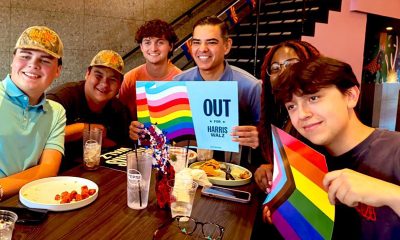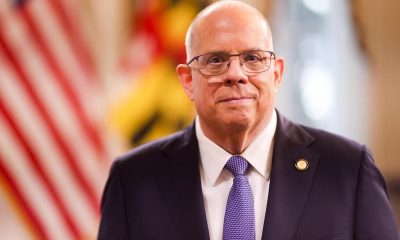National
Legal advocates turn attention to Supreme Court abortion cases
No major LGBTQ rights cases before court this term

With the new term for the U.S. Supreme Court underway, justices for the first time in years won’t have to consider a major case specifically impacting LGBTQ rights, which legal advocates say will lead to them to focus their attention on high-profile cases that challenge a woman’s right to access abortion.
At the top of the watch list for court, which now has 6-3 conservative majority as a result of appointments under former President Trump, is Dobbs v. Jackson Women’s Health Organization, which will determine the constitutionality of the Mississippi law banning abortion after 15 weeks and is widely considered a direct challenge to long-standing precedent established by Roe v. Wade guaranteeing a right to abortion. The Texas law banning any abortion after six weeks, which the Supreme Court allowed to take effect as litigation against it proceeds, is still pending in lower courts, but will likely reach the high court soon.
For many LGBTQ legal advocates, the abortion cases are important because they say the outcome could directly impact legal precedent underpinning major Supreme Court decisions in favor, including the 2003 decision of Lawrence v. Texas, which struck down state bans on sodomy, and the 2015 decision of Obergefell v. Hodges in favor of same-sex marriage nationwide.
Camilla Taylor, director of constitutional litigation for Lambda Legal, said the outcome abortion cases is crucial not only because LGBTQ people need access to abortion.
“Just as importantly, there are a lot of ways in which the landmark precedents that we obtained that vindicate the rights of LGBT people rely upon a foundation of substantive due process precedent that includes Roe v. Wade, and other cases dealing with reproductive health,” Taylor said. “So, if Roe versus Wade crumbles, then the foundation on which our own cases also crumbles.”
As such, a coalition of LGBTQ legal groups—including the National Center for Lesbian Rights, the National Center for Transgender Equality and Equality California—was among those who filed a friend-of-the-court brief in September arguing the Mississippi law is unconstitutional.
Key among the arguments is the denial of abortion access is a form of sex discrimination, just as the Supreme Court determined last year in Bostock v. Clayton County that anti-LGBTQ discrimination is a form of sex discrimination, this illegal under the Civil Rights Act of 1964.
“By the same logic, laws that restrict abortion also facially discriminate based on sex,” the brief says, “Like being LGBTQ, pregnancy is a sex-based characteristic; it is ‘inextricably bound up with’ an individual’s sex. Accordingly, laws that force a pregnant woman to bear a child necessarily discriminate based on sex, as would a law that barred a reproductive medical procedure available only to men.”
It’s true that both Roe v. Wade and the Supreme Court’s decision for LGBTQ were based on principals of due process and equal protection under the 5th and 14th Amendments of the U.S. Constitution. But not all legal experts agree LGBTQ rights are on the line depending on the outcome of abortion litigation.
Dale Carpenter, a conservative law professor at the SMU (Southern Methodist University) Dedman School of Law who’s written in favor of LGBTQ rights, said the Supreme Court is “probably going to write a narrower opinion, if it even overrules Roe,” but won’t issue a radical decision “that reaches out and destroys all unenumerated rights.”
“Obergefell relies on the fundamental right to marry,” Carpenter said. “There’s no chance the Supreme Court is going to say there is no right to a fundamental right to marry. The doctrine upon which Obergefell rests is on much more solid footing than abortion rights. The basic doctrine underlying Obergefell has never seriously been challenged; abortion rights have been for 50 years.”
Other key differences between the right to abortion and same-sex marriage, Carpenter said, are an arguable state interest in protecting fetal life and reliance interests in the case of marriage rights given thousands of same-sex couples have wed in the wake of the Obergefell decision.
But what about Lawrence v. Texas, which were both that LGBTQ rights decision and Roe v. Wade decided at least in part on finding an unenumerated right to privacy in the constitution? Carpenter said a Supreme Court decision undoing a right to privacy would mean undoing nearly 60-year precedent that began with the 1965 decision in Griswold v. Connecticut, which overturned a state ban on contraceptives.
“There’s not even a single brief in the case, that I know of, on the anti-abortion side that’s supporting that,” Carpenter said.
Carpenter concluded with a wry jab: “By the way, the LGBT rights advocates who are now saying that these LGBT rights decisions are in danger will be the same people say after Roe is a overruled that those decisions are not affected.”
Indeed, the Supreme Court under its current 6-3 conservative makeup had an opportunity to take up an Indiana birth certificate case, Box v. Henderson, that was a direct challenge to the Obergefell marriage decision, but declined to take up the case. No state is any where close to recriminalizing sexual relations for same-sex couples, which in 2021 would widely be seen as a human rights violation.
But legal advocates for the LGBTQ community aren’t limiting the relationship between abortion and LGBTQ rights to legal principles. Additionally, the identify solidarity with another minority group under siege, in this case women seeking access to abortion, and need among certain members of the LGBTQ community—lesbian and bisexual women, transgender men and non-binary people—to have the access to abortion.
Shannon Minter, legal director for the National Center for Lesbian Rights, echoed the sense LGBTQ legal advocates are focused on abortion cases, but cited “overlap between the reproductive rights, and justice movement and the LGBTQ movements.”
“What we see is the primary impact of this case on our community is a very direct one,” Minter said. “It’s extremely direct. The ability to obtain abortions is of great importance to women in our community, and also to transgender men and non-binary people as well.”
Minter cited data finding upwards of 80 percent of bisexual women will experience pregnancy over their lives and said LGBTQ women “are significantly more likely to have unintended pregnancies as a result of sexual violence, which is very distressing, but that is a reality for our community.”
Lesbian young adults and adolescents are at particular risk for unwanted pregnancy, Minter added, because there’s still “so much stigma and discrimination that they tried to sort of hide their sexual orientation, and prove that they’re straight when they’re not, so they actually have high rates of unprotected sex.”
Religious schools funding, gun control, Obamacare on docket
The abortion cases aren’t the only litigation on the radar for LGBTQ legal advocates. Also on the list are cases that will determine whether Maine religious schools have access to public funds, the legality of New York State gun regulations and disparate impact claims under Obamacare.
Taylor said the case of CVS Pharmacy v. Doe before the Supreme Court, which was brought by people living with HIV/AIDS, will determine whether disparate impact claims are cognizable in the context of disabilities under the Affordable Care Act.
“That’s really important for people living with HIV and other people with disabilities,” Taylor said. “It could do a lot of harm.”
The oral arguments in the Dobbs case are set to take place before the Supreme Court on Dec. 1.
State Department
HIV/AIDS activists protest at State Department, demand full PEPFAR funding restoration
Black coffins placed in front of Harry S. Truman Building

Dozens of HIV/AIDS activists on Thursday gathered in front of the State Department and demanded the Trump-Vance administration fully restore President’s Emergency Plan for AIDS Relief funding.
Housing Works CEO Charles King, Health GAP Executive Director Asia Russell, Human Rights Campaign Senior Public Policy Advocate Matthew Rose, and others placed 206 black Styrofoam coffins in front of the State Department before the protest began.
King said more than an estimated 100,000 people with HIV/AIDS will die this year if PEPFAR funding is not fully restored.
“If we continue to not provide the PEPFAR funding to people living in low-income countries who are living with HIV or at risk, we are going to see millions and millions of deaths as well as millions of new infections,” added King.
Then-President George W. Bush in 2003 signed legislation that created PEPFAR.
The Trump-Vance administration in January froze nearly all U.S. foreign aid spending for at least 90 days. Secretary of State Marco Rubio later issued a waiver that allows the President’s Emergency Plan for AIDS relief and other “life-saving humanitarian assistance” programs to continue to operate during the freeze.
The Washington Blade has previously reported PEPFAR-funded programs in Kenya and other African countries have been forced to suspend services and even shut down because of a lack of U.S. funding. Two South African organizations — OUT LGBT Well-being and Access Chapter 2 — that received PEPFAR funding through the U.S. Agency for International Development and the Centers for Disease Control and Prevention in recent weeks closed down HIV-prevention programs and other services to men who have sex with men.
Rubio last month said 83 percent of USAID contracts have been cancelled. He noted the State Department will administer those that remain in place “more effectively.”
“PEPFAR represents the best of us, the dignity of our country, of our people, of our shared humanity,” said Rose.
Russell described Rubio as “ignorant and incompetent” and said “he should be fired.”
“What secretary of state in 90 days could dismantle what the brilliance of AIDS activism created side-by-side with George W. Bush? What kind of fool could do that? I’ll tell you who, the boss who sits in the Harry S. Truman Building, Marco Rubio,” said Russell.

U.S. Military/Pentagon
Pentagon urged to reverse Naval Academy book ban
Hundreds of titles discussing race, gender, and sexuality pulled from library shelves

Lambda Legal and the Legal Defense Fund issued a letter on Tuesday urging U.S. Defense Secretary Pete Hegseth to reverse course on a policy that led to the removal of 381 books from the Nimitz Library of the U.S. Naval Academy in Annapolis, Md.
Pursuant to President Donald Trump’s executive order 14190, “Ending Radical Indoctrination in K-12 Schooling,” the institution screened 900 titles to identify works promoting “diversity, equity, and inclusion,” removing those that concerned or touched upon “topics pertaining to the experiences of people of color, especially Black people, and/or LGBTQ people,” according to a press release from the civil rights organizations.
These included “I Know Why the Caged Bird Sings” by Maya Angelou, “Stone Fruit” by Lee Lai, “The Hate U Give” by Angie Thomas, “Lies My Teacher Told Me: Everything Your American History Textbook Got Wrong” by James W. Loewen, “Gender Queer: A Memoir” by Maia Kobabe, and “Democracy in Black: How Race Still Enslaves the American Soul” by Eddie S. Glaude, Jr.
The groups further noted that “the collection retained other books with messages and themes that privilege certain races and religions over others, including ‘The Clansman: A Historical Romance of the Ku Klux Klan’ by Thomas Dixon, Jr., ‘Mein Kampf’ by Adolf Hitler, and ‘Heart of Darkness’ by Joseph Conrad.
In their letter, Lambda Legal and LDF argued the books must be returned to circulation to preserve the “constitutional rights” of cadets at the institution, warning of the “danger” that comes with “censoring materials based on viewpoints disfavored by the current administration.”
“Such censorship is especially dangerous in an educational setting, where critical inquiry, intellectual diversity, and exposure to a wide array of perspectives are necessary to educate future citizen-leaders,” Lambda Legal Chief Legal Officer Jennifer C. Pizer and LDF Director of Strategic Initiatives Jin Hee Lee said in the press release.
Federal Government
White House sues Maine for refusing to comply with trans athlete ban
Lawsuit follows months-long conflict over school sports in state

The Justice Department is suing the state of Maine for refusing to comply with President Donald Trump’s executive order banning transgender athletes from participating in school sports, U.S. Attorney General Pam Bondi announced on Wednesday.
DOJ’s lawsuit accuses the state of violating Title IX rules barring sex discrimination, arguing that girls and women are disadvantaged in sports and deprived of opportunities like scholarships when they must compete against natal males, an interpretation of the statute that reverses course from how the law was enforced under the Biden-Harris administration.
“We tried to get Maine to comply” before filing the complaint, Bondi said during a news conference. She added the department is asking the court to “have the titles return to the young women who rightfully won these sports” and may also retroactively pull federal funding to the state for refusing to comply with the ban in the past.
Earlier this year, the attorney general sent letters to Maine, California, and Minnesota warning the blue states that the department “does not tolerate state officials who ignore federal law.”
According to the Maine Principals’ Association, only two trans high school-aged girls are competing statewide this year. Conclusions from research on the athletic performance of trans athletes vis-a-vis their cisgender counterparts have been mixed.
Trump critics and LGBTQ advocates maintain that efforts to enforce the ban can facilitate invasive gender policing to settle questions about an individual athlete’s birth sex, which puts all girls and women at risk. Others believe determinations about eligibility should be made not by the federal government but by school districts, states, and athletics associations.
Bondi’s announcement marked the latest escalation of a months-long feud between Trump and Maine, which began in February when the state’s Democratic governor, Janet Mills, declined to say she would enforce the ban.
Also on Wednesday, U.S. Education Secretary Linda McMahon said the findings from her department’s Title IX investigation into Maine schools — which, likewise, concerned their inclusion of trans student-athletes in competitive sports — was referred to DOJ.
Earlier this month, the Justice Department pulled $1.5 million in grants for Maine’s Department of Corrections because a trans woman was placed in a women’s correctional facility in violation of a different anti-trans executive order, while the U.S. Department of Agriculture paused the disbursement of funds supporting education programs in the state over its failure to comply with Title IX rules.
A federal court last week ordered USDA to unfreeze the money in a ruling that prohibits the agency from “terminating, freezing, or otherwise interfering with the state’s access to federal funds based on alleged Title IX violations without following the process required by federal statute.”
-

 District of Columbia5 days ago
District of Columbia5 days agoFinal push to raise funds, fill D.C. hotels as WorldPride nears
-

 El Salvador3 days ago
El Salvador3 days agoGay Venezuelan makeup artist remains in El Salvador mega prison
-

 District of Columbia4 days ago
District of Columbia4 days agoReenactment of 1965 gay rights protest at White House set for April 17
-

 Maryland5 days ago
Maryland5 days agoFreeState Justice: Transgender activist ‘hijacked’ Moore’s Transgender Day of Visibility event












